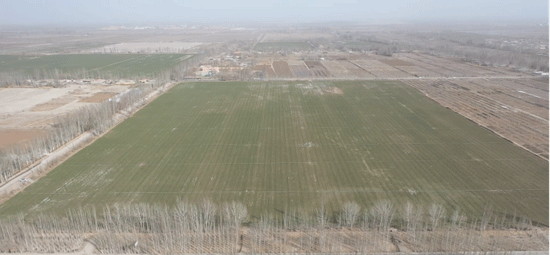In recent years, Yuepuhu County has actively pursued the “Storing Grain in the Land and Technology” strategy, focusing on high-standard farmland construction and optimal land resource allocation. A key initiative has been the consolidation of fragmented farmland through the “Small Fields into Large Fields” program, facilitating mechanized operations and enhancing production efficiency. This approach not only streamlines farming practices but also reduces labor costs, contributing to increased agricultural productivity.
A cornerstone of these advancements is the adoption of drip irrigation technology. By precisely delivering water and nutrients directly to the root zones of crops, drip irrigation significantly improves water use efficiency and promotes uniform crop growth. This method minimizes water wastage and ensures that each wheat plant receives adequate moisture and nutrients, leading to healthier plants and higher yields.
The benefits of these practices are evident in the experiences of local farmers. For instance, Turxunjiang Wubuli, a farmer from Tielemu Town’s Mogale Village, reported that after implementing drip irrigation, his wheat yield increased by approximately 70 to 80 kilograms per mu (approximately 1,050 to 1,200 kilograms per hectare). He noted that previously, uneven watering led to inconsistent wheat growth, but with drip irrigation, each plant receives sufficient water, resulting in robust and uniform growth.
To support these technological advancements, Yuepuhu County has introduced various farmer-friendly policies. These include subsidies for winter wheat cultivation and the timely application of green-up water, reducing production costs and encouraging farmers to adopt modern agricultural practices. Additionally, the county has strengthened the construction and maintenance of water conservancy facilities to ensure a stable water supply for irrigation needs.
Agricultural technicians play a vital role in this transformation by providing on-site training and guidance. They offer detailed instructions on fertilization, irrigation, and pest control during the wheat green-up stage, helping farmers address practical challenges and improve their management skills. This hands-on support ensures that technological innovations are effectively integrated into daily farming activities.
As a result of these combined efforts, Yuepuhu County’s winter wheat planting area has expanded to 210,000 mu (approximately 14,000 hectares), with a significant portion utilizing drip irrigation technology. This integration of modern agricultural techniques has led to increased yields and resource efficiency, providing a solid foundation for rural revitalization and serving as a model for other regions aiming to enhance agricultural productivity.
Yuepuhu County’s strategic implementation of land consolidation and drip irrigation has effectively enhanced winter wheat production. These measures have not only increased yields but also optimized resource utilization, demonstrating the potential of modern agricultural practices in achieving sustainable and efficient food production.
Error




